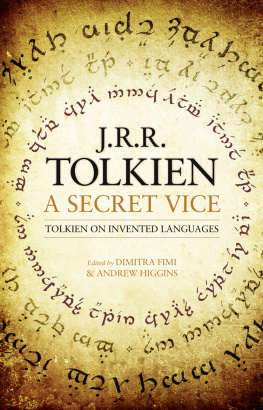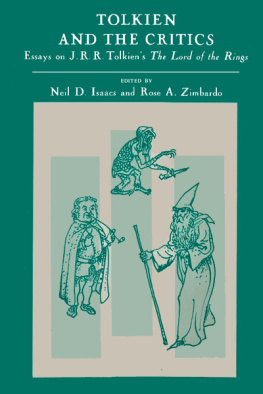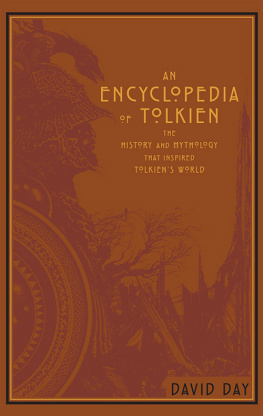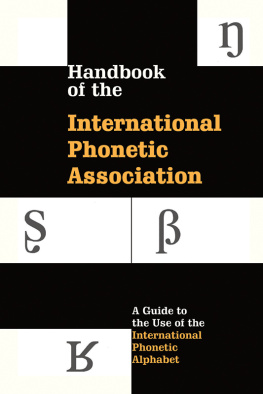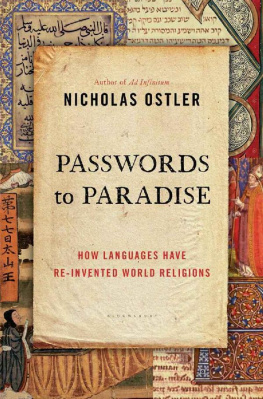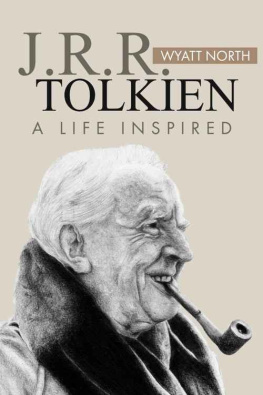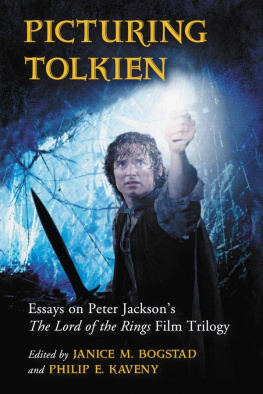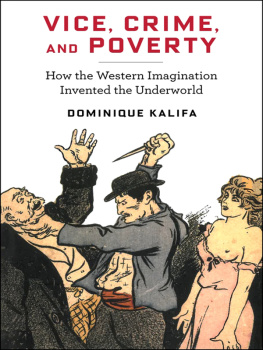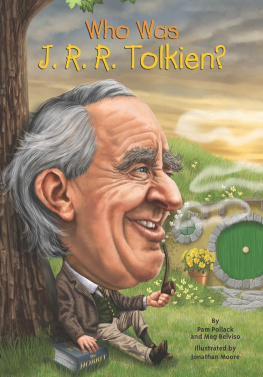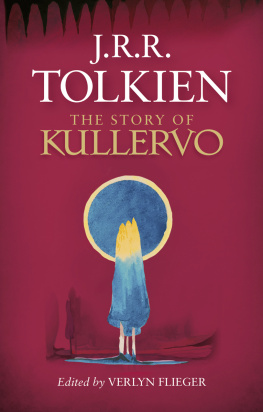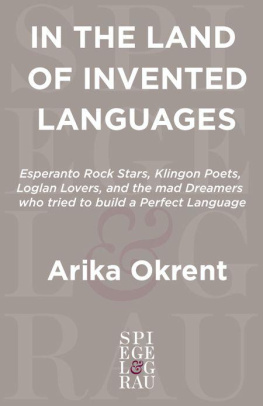Fimi Dimitra - A secret vice: Tolkien on invented languages
Here you can read online Fimi Dimitra - A secret vice: Tolkien on invented languages full text of the book (entire story) in english for free. Download pdf and epub, get meaning, cover and reviews about this ebook. City: London, year: 2016, publisher: HarperCollinsPublishers, genre: Home and family. Description of the work, (preface) as well as reviews are available. Best literature library LitArk.com created for fans of good reading and offers a wide selection of genres:
Romance novel
Science fiction
Adventure
Detective
Science
History
Home and family
Prose
Art
Politics
Computer
Non-fiction
Religion
Business
Children
Humor
Choose a favorite category and find really read worthwhile books. Enjoy immersion in the world of imagination, feel the emotions of the characters or learn something new for yourself, make an fascinating discovery.
- Book:A secret vice: Tolkien on invented languages
- Author:
- Publisher:HarperCollinsPublishers
- Genre:
- Year:2016
- City:London
- Rating:3 / 5
- Favourites:Add to favourites
- Your mark:
- 60
- 1
- 2
- 3
- 4
- 5
A secret vice: Tolkien on invented languages: summary, description and annotation
We offer to read an annotation, description, summary or preface (depends on what the author of the book "A secret vice: Tolkien on invented languages" wrote himself). If you haven't found the necessary information about the book — write in the comments, we will try to find it.
A secret vice: Tolkien on invented languages — read online for free the complete book (whole text) full work
Below is the text of the book, divided by pages. System saving the place of the last page read, allows you to conveniently read the book "A secret vice: Tolkien on invented languages" online for free, without having to search again every time where you left off. Put a bookmark, and you can go to the page where you finished reading at any time.
Font size:
Interval:
Bookmark:



Published by HarperCollinsPublishers Ltd
1 London Bridge Street
London SE1 9GF
www.tolkien.co.uk
www.tolkienestate.com
Published by HarperCollinsPublishers 2016
All texts and materials by J.R.R. Tolkien The Tolkien Estate and The Tolkien Trust 1983, 2016
Foreword, Introduction, Notes and Coda Dimitra Fimi & Andrew Higgins 2016
 and Tolkien are registered trade marks of
and Tolkien are registered trade marks of
The Tolkien Estate Limited
The Proprietor on behalf of the Author and the Editors hereby assert their respective moral rights to be identified as the author of the work.
A CIP catalogue record for this book is available from the British Library
All rights reserved under International and Pan-American Copyright Conventions. By payment of the required fees, you have been granted the non-exclusive, non-transferable right to access and read the text of this e-book on screen. No part of this text may be reproduced, transmitted, down-loaded, decompiled, reverse engineered, or stored in or introduced into any information storage and retrieval system, in any form or by any means, whether electronic or mechanical, now known or hereinafter invented, without the express written permission of HarperCollins.
Source ISBN: 9780008131395
Ebook Edition April 2016 ISBN: 9780008131401
Version: 2016-03-21
Contents
A Secret Vice is widely considered to be the principal exposition of J.R.R. Tolkiens art of inventing languages. In this essay, Tolkien charts his first ventures in language creation during childhood and adolescence through to the development of his first artistic imaginary languages, which later became the heart of his mythology. It includes samples of these languages in the form of poetry and outlines Tolkiens theories on the aims and purposes of composing imaginary languages within a fictional setting. The essay also outlines and interrogates important views and theories about the nature of language itself, and delineates Tolkiens own bold ideas on language as art, as well as language change and language preferences.
This volume makes available for the first time all the drafts of, and attendant notes for, A Secret Vice currently deposited in the Bodleian Library as part of their holdings labelled MS Tolkien 24. In Part I of this extended edition we present Tolkiens lecture, A Secret Vice, delivered in 1931, including new sections not printed before. Part II contains a brief essay by J.R.R. Tolkien on Phonetic Symbolism, which appears here for the first time. Part III presents Tolkiens hitherto unpublished notes and drafts associated with both essays. The present edition, therefore, contains significant new material by J.R.R. Tolkien and shows that the previously published text of A Secret Vice that is printed in The Monsters and the Critics and Other Essays was the product of an extended series of notes and drafts, including an entire related essay. Published together, the papers provide an expanded view of Tolkiens thoughts and ideas on language invention and related linguistic notions, especially as they pertain to the relationship between language and art. This additional material also places the essay firmly within the intellectual context of the 1920s and 1930s: the tail-end of the fin de sicle vogue for international auxiliary languages (languages constructed to aid international communication, such as Esperanto); the empirical research and theoretical work of linguists such as Edward Sapir and Otto Jespersen on sound symbolism; and the Modernist experimentation with language. Tolkiens secret vice of devising imaginary languages (languages invented for works of fiction) enriched the long tradition of fictional languages and fantasy literature, while simultaneously offering a considered and studied response to intellectual trends of the time. This extended edition situates A Secret Vice within its immediate and larger historical, cultural and intellectual context, and provides extensive notes on both essays and the rest of the new material that is presented here for the first time.
For this expanded edition of A Secret Vice we have tried to be faithful to the text while making it as readable as possible, with minimal editorial intrusion. We have adhered to the conventions below:
- Tolkien was not consistent in using single or double quotation marks, and this text reflects his inconsistency
- Words or phrases which defy decipherment are marked as {illeg}
- Words written above other words where neither is cancelled are divided by a slash: /
- Where Tolkien used abbreviations (e.g., Gmc, &c., OE) we have spelled out the words in full (Germanic, etc., Old English)
- We have regularized some punctuation and (when called for) inserted Tolkiens marginal notes in the appropriate places in the main body of the text
- Tolkien occasionally wrote abbreviated thoughts instead of full sentences, and while this has sometimes resulted in a syntactical incoherence, we have preferred to let these stand rather than to intrude editorially
- Curly brackets are used to denote editorial material, while square brackets are Tolkiens own
- A superscript following a word or phrase in Tolkiens text signals that there is an endnote on this material
Verlyn Flieger and Douglas A. Anderson have justly named On Fairy-stories as Tolkiens manifesto on the art of writing fantasy (TOFS, p. 9). This volume aims to confirm that A Secret Vice is an equally indispensable manifesto for the parallel (and for Tolkien coeval) art of language invention, deserving of its rightful place in the Tolkien canon. A Secret Vice (and Tolkiens language invention itself) has often been neglected by critics. One of the aims of this edition is to re-open the debate on the importance of linguistic invention in Tolkiens mythology and the role of fictional languages in imaginative literature in general. At the same time, the wealth of new material by Tolkien uncovered and presented here affords readers the opportunity to truly appreciate the original ideas on language and art postulated by one of the most innovative academic and creative linguistic minds of the twentieth century.
We are grateful to the Tolkien Estate for entrusting us with this project and for permission to use Tolkiens manuscripts. A special thanks to Cathleen Blackburn of Maier Blackburn for her support. We are indebted to Catherine Parker and Colin Harris at the Bodleian Library for their generous assistance. For access to the Exeter and Pembroke College Archives we thank Penny Baker and Amanda Ingram. Extracts from the minutes of the Johnson Society are reprinted by kind permission of the Master, Fellows and Scholars of Pembroke College, Oxford. Many thanks also to Andrew Honey at the Bodleian and Simon Bailey at the University of Oxford Archives. We are grateful for invaluable help and advice from Douglas Anderson, Mark Atherton, Carmen Casaliggi, Verlyn Flieger, Nelson Goering, Alaric Hall, John Hines, Carl Hostetter, George Kotzoglou, Philip Leube, Carl Phelpstead, John Rateliff, Claire Richards and Patrick Wynne. Our colleagues Kathryn Simpson, Meryl Hopwood, Kate North, and Michelle Deininger were a constant source of support during this project. Thanks also to Chris Smith, editorial director of HarperCollins, for encouragement and advice; and to Charles Noad for his scrupulous editing and eagle eye.
Font size:
Interval:
Bookmark:
Similar books «A secret vice: Tolkien on invented languages»
Look at similar books to A secret vice: Tolkien on invented languages. We have selected literature similar in name and meaning in the hope of providing readers with more options to find new, interesting, not yet read works.
Discussion, reviews of the book A secret vice: Tolkien on invented languages and just readers' own opinions. Leave your comments, write what you think about the work, its meaning or the main characters. Specify what exactly you liked and what you didn't like, and why you think so.

